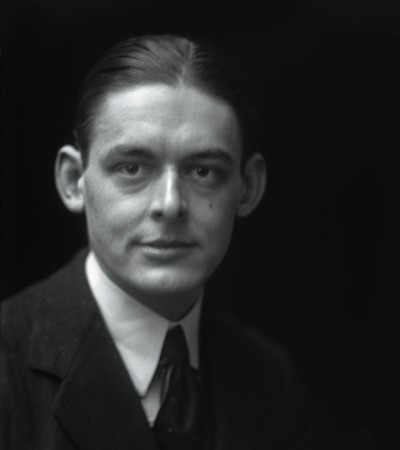Source: The College Syllabi That Shaped ‘The Waste Land’: Longreads Blog
The above article reminds me of my college days when I had to study and prepare an assignment for ‘The Wasteland’. It was not an assignment but a research to be submitted.

‘The Waste Land’ incorporates quotations from multiple languages and pieces of literature which are seen as a tribute to the educational philosophy.

Photograph by E.O. Hopp/Corbis Images
Adam Kirsch in Harvard Magazine states that – “IF IT IS TRUE that the child is father to the man, then no poet disavowed his paternity as successfully as T.S. Eliot ’10, A.M. ’11, Litt.D. ’47. Looking at the severe, bespectacled face of the elderly poet on the cover of hisComplete Poems and Plays, it is hard to imagine that he was ever young. Eliot was awarded Nobel Prize in the year 1948. He revolutionized the canon of English poetry with serene confidence.
Eliot remains absolutely central to the history of modern poetry, his personal authority inevitably declined in the years after his death, in tandem with changes in taste and critical method. “Melange of topics” that Eliot explored in college “mightily enriched his poetry.” Eliot’s studies with the philosopher George Santayana planted the seeds of the idea that later emerged in his criticism as the “objective correlative”—the notion that poetic images function as a formula to evoke an emotion. This would become a major technique of “The Waste Land,” which uses the Grail legend, as interpreted by scholars like James Frazer and Jessie Weston, as a structuring myth.
In the Collected Prose, it’s possible to read one of his few surviving undergraduate papers, an essay for English 12 titled “The Defects of Kipling,” in which the mature Eliot’s tone of critical certainty is already audible: “Nothing is so pathetic in literature as the immaturity which the practiced brain cannot shake off, nor the practiced hand conceal,” he pronounces. (The paper earned a B+.) But for all he learned in the classroom, it was his private, extracurricular reading that had the biggest influence on his intellectual and poetic development. He arrived at Harvard already a writer and a poet and published in the Advocate in his freshman year.
I shall conclude with these lines from ‘The Wasteland’ –
April is the cruelest month, breeding
Lilacs of the dead land, mixing
Memory and desire, stirring
Dull roots with spring rain.
Winter kept us warm, covering
Earth in forgetful snow, feeding
A little life with life tubers.
Truly, T.S. Eliot is a legend in modern poetry!






June 26, 2015
I was introduced to the Wasteland by a blogger a few weeks ago. 🙂
June 27, 2015
Oh! That is wonderful. Would love to know the blogger who has common interests. 🙂
September 1, 2015
And then of course, there is, “The Love Song of J Alfred Prufrock.”
Not an accurate quote but close enough,
“I felt the moment of my greatness flicker.
I saw the eternal footman take my coat and snicker,
and in short, I was afraid.”
For Elliot the world ended not in a bang but in a whimper.
He was wise.
Tagore more so.
September 1, 2015
Wow! the lines you quoted from the poem are wonderful. I remember the beginning lines- “Let us go then, you and I,
When the evening is spread out against the sky
Like a patient etherized upon a table;
Let us go, through certain half-deserted streets,
The muttering retreats
Of restless nights in one-night cheap hotels
And sawdust restaurants with oyster-shells:
Streets that follow like a tedious argument
Of insidious intent
To lead you to an overwhelming question…
Oh, do not ask, “What is it?”
Let us go and make our visit.”
I am glad you liked this post on T.S. Eliot and on Tagore. I guess we have something in common to share now. 🙂